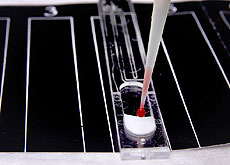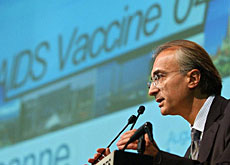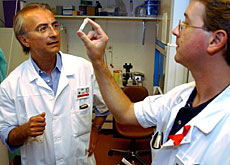Experts take stock of hunt for Aids vaccine

Leading scientists from around the world, including Switzerland, are gathering in Canada to discuss the latest developments in the search for an HIV vaccine.
The conference in Montreal, which has been described by organisers as “critical”, comes as the number of new infections and deaths continues to rise.
The latest figures released by the Joint United Nations Programme on HIV/Aids (UNAids) show that the number of people living with HIV has reached its highest level ever.
Last year there were almost five million new cases, and close to 40 million people are now living with the virus. In July UNAids stressed the need to find longer-term solutions, such as a vaccine.
“The epidemic is spreading to unchartered territories. An HIV prophylactic vaccine remains the only hope left for millions of individuals around the world to stop the damage caused by this disease,” Rafick-Pierre Sékaly, chairman of the Aids Vaccine 2005 conference, said in a statement.
“It is a moral obligation for our society to gather its forces and resources and to commit to initiate all the efforts needed for the development of an HIV vaccine.”
Organisers are hoping the meeting will build on last year’s conference in the Swiss city of Lausanne, which ended with calls for increased international cooperation in the hunt for a vaccine.
Last year’s event was organised jointly by Lausanne University Hospital and EuroVacc, a Swiss-based foundation whose mission is to develop an HIV vaccine.
Clinical trials
Professor Giuseppe Pantaleo, who heads the hospital’s Aids immunopathology department, is currently conducting clinical trials of a vaccine.
But Pantaleo, who will be in Montreal, maintains that the discovery of a preventive vaccine is unlikely to happen within the next decade.
This is a view shared by Professor Luc Perrin, head of the laboratory of clinical virology at Geneva University Hospital, who believes that a longer timeframe is probably more realistic.
Perrin told swissinfo that the mutation and complexity of the virus meant that experts were still a long way from finding an effective vaccine.
“Nothing is working and what is clear is that no vaccine is effective,” he said. “If you discuss this with certain people, they will tell you that they don’t think a vaccine will be developed within the next 20 years.”
According to Perrin, research into an HIV vaccine is currently at a crossroads. He said many teams around the world were trying different things but there was “no preferred way to go”.
“We need another step in scientific development which is not there right now,” he said. “But that does not mean we should stop working on this.”
However, Perrin said there needed to be better international coordination to prevent “replicating the same kind of experiment in three different places”.
swissinfo, Adam Beaumont
According to UNAids, the number of people living with HIV has been rising in every region, with the steepest increases occurring in East Asia, Central Asia and eastern Europe.
Sub-Saharan Africa remains the worst affected region. It is home to more than 60% of all people living with HIV and three-quarters of all women living with the virus.
Aids Vaccine 2005 takes place from September 6-9 in Montreal, Canada.
More than 800 specialists from around the world are expected to attend.

In compliance with the JTI standards
More: SWI swissinfo.ch certified by the Journalism Trust Initiative


You can find an overview of ongoing debates with our journalists here. Please join us!
If you want to start a conversation about a topic raised in this article or want to report factual errors, email us at english@swissinfo.ch.